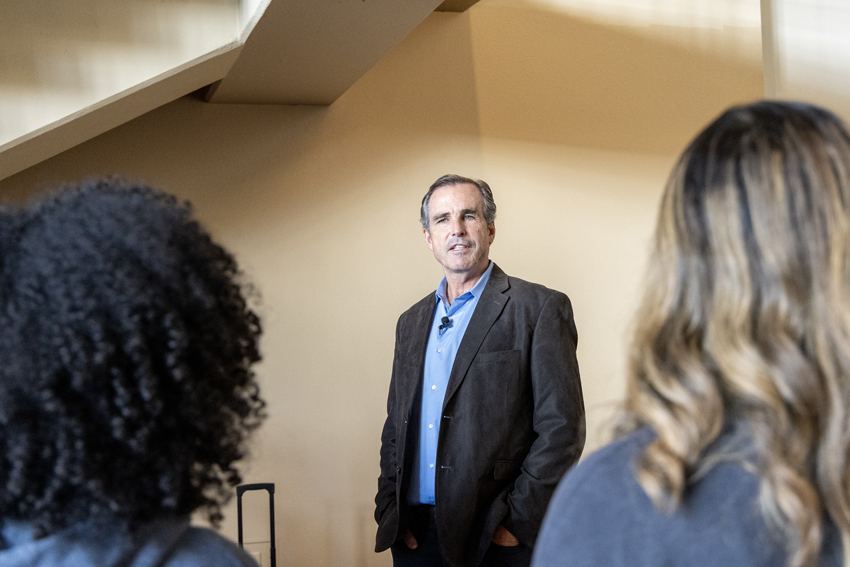Doctors emphasize importance of mental health
Anxiety and stress, an ever-present obstacle among kids, affects 25% of children according to an article written by Elements Behavior Health. It is quite normal for teens to feel pressure, especially during this particular age.
However, if it is not treated accurately at an age where adults can catch unusual behaviors at the start, every small insecurity the child holds could turn into a drastic problem. Depression, known to cripple the mind, not only gives a person the blues, but prevents them from effectively performing normal everyday activities.

One of the most common mental disorders, depression affects over 1.9 million young adults. From 2017-2018, the percentage of teenagers experiencing severe depression increased from 7.4% to 8.2%, according to Mental Health America.
Christopher H Rosik, a licensed psychologist who currently practices at Link Care Center, and who also wrote more than 45 articles in the subjects of the dissociative disorders, psychological care of missionaries, and homosexuality, believes that isolation plays a major role in worsening the illness and acknowledges that belonging somewhere is key to recovering from depression.
“Depression may be on the increase for young people, adolescence in particular,” Rosik said. “Some major things that make people more resilient against depression is feeling connected and a sense of belongingness. In our culture increasingly, kids with connections are being fragmented. Whether that’s our family, a place where people should have major connections, or a church community.
“Those are two main examples that everybody can relate to,” Rosik continued. “Those natural places for belonging and sense of connection are fragmenting. Examples of that is divorce and dropping out of church communities. It takes away some of the sources of strength and resilience for people, so they’re less resilient in the face of disappointments and things that happen in life because they’re just not connected.”
As teens digitally connect with people from across the world, they carry a sense of joy as they ‘build’ relationships. But social media profiles are not humans, as many tend to confuse the two. High school students tend to mask themselves by posting aesthetic photographs and things portraying their life in a particular, typically the best, way.
Dr. Christopher Rosik discusses the impact of depression and ways to control it.
According to Rosik, social media contributes the rise in depression as it disconnects people from society.
“So that’s a real problem, and the more time young people spend on social media, there seems to be an equivalent relation with depression,” Rosik said. “They are more at risk for depression. Implicit in those reasons are things that can help people get out of depression are finding connections, friends in real time, face to face. Staying off social media, maybe fast it for a while to help clear your brain. The time you spend on social media could be invested in making real time relationships.”
An FC student shares how she found joy in Home Economics and how that eventually helped her to overcome her depression. The student requested not to be named.
“I got really deep into depression around sixth grade. I felt like I was always being pulled under, and at points I didn’t feel like swimming back up,” the student said. “It was hard to talk to someone, and then to have someone hurt me who I trusted really set a dark place in my mind. The lie that I believed was that I was meant to be hurt, I was like a punching bag everybody could hit. But the turning point came when I started doing Home Ec, I was happy there. I’ve never felt such joy like this before.”
The Feather Online continues it’s coverage on teen depression.
Campus student seeks strategies to tackle #depression http://t.co/zIUuNAgjRq
— The Feather Online (@thefeather) March 26, 2014
Bryan Sutherland, worship pastor at GateWay City Church in San Jose, and also in charge of Vision Guitar, explains in a spiritual perspective how the Bible guides us and helps us give our troubles to God. Sutherland believes that God can heal the chemical imbalance in the brain that causes depression.
“Isaiah 61 talks about giving our heaviness to the Lord,” Sutherland said. “The ‘garment of praise’ is key to understanding this, because the Bible is clear about the importance of our attitude. It uses the word ‘garment’ as to say we have to put it on like a coat. Sometimes we’re going to feel worthless, but we must choose to believe God’s report for our lives, and we know that it isn’t His will that we suffer.”
Sutherland also believes that depression must be diagnosed by a licensed psychiatrist.
“I think the term is thrown around too loosely, and it’s even a catchphrase among young people to say ‘I feel depressed’ or ‘I want to die,'” Sutherland said. “Sadness is an emotion given by God, and it has a purpose. Sometimes people are just sad about things. You can’t get the two mixed up. It’s not unusual to feel sad due to disappointments and setbacks in life, in fact, it’s normal to experience those emotions. Every human is wired with feelings, it’s part of our DNA. But when it’s all the time, that’s when seeing a local psychologist is recommended.”
Another FC student who requested not to be named, shares how he overcame depression by realizing that his perspective was all that mattered in the situation.
“Third and fourth grade were the beginning of bullying for me,” the student said. “Being called names is not something that really helps you out, it honestly makes you think, ‘what is wrong with me?’ After this experience, I found that depression was something like a lingering spirit that was on me at the time. You can either let depression drag you down, or put on a different perspective and realize that it’s something that isn’t of God, and that you shouldn’t pay attention to it.”

Licensed counselors at The Well Community Church make themselves available to everybody, and opportunities for getting help are always accessible. They provide counseling and guidance on how to overcome struggles. Introductory steps into recovery include medication and therapy. PsychologyToday offers a large scale of psychologists and doctors who can help.
Megan Vello, one of the licensed psychologists at The Well, offers an understanding on how it’s important to talk about how someone feels and to not be afraid about what others think. Vello encourages students to be vulnerable as she finds many share similar experiences and feelings.
“For teens, there’s an overwhelming pressure to be accepted by friends that can sometimes make it hard to talk about struggles. In order to be accepted, we hide hard parts of our life,” Velo said. “I think another reason that it is difficult to talk about hard emotions is that we often feel very alone surrounding our feelings. We think we are the only ones who feel this way and that everybody else’s life is perfect.”
Vulnerability helps not only in addressing how we feel, but also in realizing that everybody struggles. Everybody tries to find their place in this world and everybody wants to make friends. So nobody stands alone in this fight. Revealing your hidden self to other people seems uncomfortable and excruciating, but in return you have nothing to hide.
Once you lay out all your weaknesses and insecurities for people to see, everyone sees the real, authentic you. It sets them free to see you express how you feel, and it gives the weak a voice to call out for help.
If you are experiencing suicidal thoughts, call 911 or the National Suicide Prevention Hotline (open 24/7): 1-800-273-8255.
For more articles related to this subject, read Column: Toryn talks body image, and EDITORIAL: Letting go of trivial issues
Mackenzie Beckworth can be reached via email and via Twitter.




